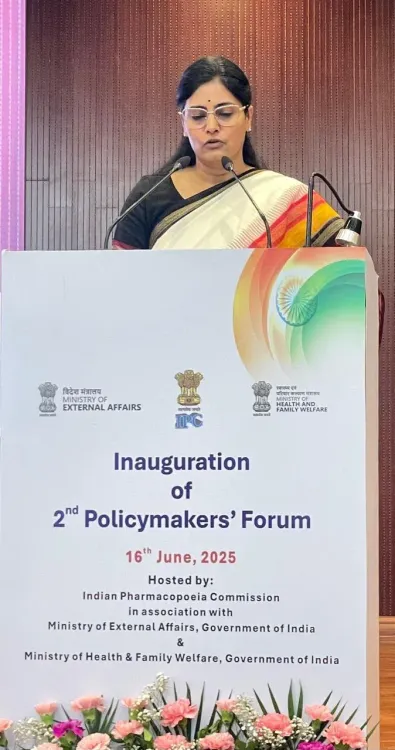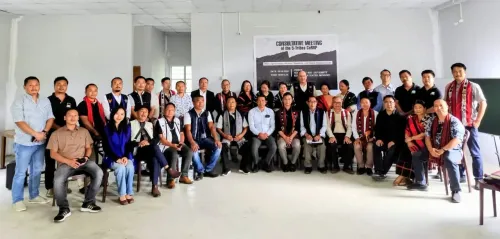Is India Still the Leading Global Supplier of Vaccines and Generic Drugs?

Synopsis
Key Takeaways
- India supplies 70% of WHO's vaccines.
- 14% of US generics come from India.
- India has the highest number of US FDA approved plants.
- Jan Aushadi Kendras reduce healthcare costs.
- 15 countries recognize the Indian Pharmacopoeia.
New Delhi, June 16 (NationPress) - India remains at the forefront as a global supplier of vaccines and a significant manufacturer of generic drugs, asserted Union Minister of State for Health and Family Welfare Anupriya Patel on Monday.
During the opening session of the Second Policymakers’ Forum held by the Indian Pharmacopoeia Commission (IPC) in the national capital, Patel emphasized that India stands as one of the largest contributors to the World Health Organization (WHO) and is a key exporter of generic medications to the United States.
This highlights India’s role as a reliable partner in the global health sector, she noted.
“India is a leading supplier of vaccines, with approximately 70 percent of WHO’s total vaccines coming from our country,” observed Patel.
“In drug manufacturing, especially for generic medicines, India is a powerhouse. 14 percent of the generics imported by the US originate from India, which also has the highest number of US FDA (Food and Drug Administration) approved drug manufacturing facilities,” she continued.
Patel mentioned that “70 percent of our generics are shipped to highly regulated markets, and our pharmacopeial regulations are consistently evaluated to meet global standards.”
She also pointed out India’s supply of numerous vaccines to over 100 countries under the Vaccine Maitri initiative during the Covid-19 pandemic.
Patel reiterated India’s dedication to ensuring equitable access to quality-assured medicines for its citizens. The Jan Aushadi Kendras stand as a prime example of affordable healthcare solutions, she stated.
“Our Jan Aushadhi Kendras exemplify India’s commitment to delivering quality and affordable medicines to all citizens. This initiative has substantially reduced out-of-pocket expenses for many,” she added.
Designed to enhance the recognition of the Indian Pharmacopoeia and foster collaboration within India’s flagship affordable medicines initiative - the Pradhan Mantri Bhartiya Janaushadhi Pariyojana (PMBJP) - the Forum is organized by the IPC with support from the Ministry of Health and Family Welfare and the Ministry of External Affairs.
This event builds on the success of the First Policymakers’ Forum held in August 2024, which led several participating countries to officially recognize the Indian Pharmacopoeia as a drug standards reference.
The increasing global interest in aligning with India’s regulatory frameworks underscores the credibility and scientific rigor of the Indian Pharmacopoeia and India’s proactive stance in furthering global public health goals.
Additionally, Patel mentioned that “India has maintained the WHO’s Global Benchmarking Tool (GBT) framework, achieving Maturity Level 3 (ML3) status, demonstrating the strength of India's regulatory framework. Currently, 15 countries worldwide recognize the Indian Pharmacopeia as a drug standards reference, with Cuba being the latest to do so.”
“This is not merely a regulatory step, but a significant move towards enhancing quality standards, expanding access to safe and effective medications, and facilitating smoother pharmaceutical trade,” remarked the Minister of State.
Patel reaffirmed, “We are committed to supporting our partner countries through communication and planning” and expressed hope for ongoing collaboration to advance regulatory cooperation and promote the recognition of pharmacopeial standards to achieve our shared vision of ‘Health for All.’”
This four-day event will witness participation from policymakers and senior drug regulatory officials from 22 countries, discussing pharmacopeial standards, India’s regulatory landscape, and successful public health initiatives.









